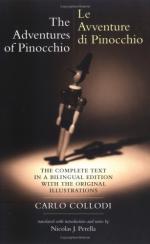The curtain had gone up and the play had already begun.
On the stage Harlequin and Punch were as usual quarrelling with each other and threatening every moment to come to blows.
All at once Harlequin stopped short and, turning to the public, he pointed with his hand to some one far down in the pit and exclaimed in a dramatic tone:
“Gods of the firmament! Do I dream or am I awake? But surely that is Pinocchio!”
“It is indeed Pinocchio!” cried Punch.
“It is indeed himself!” screamed Miss Rose, peeping from behind the scenes.
“It is Pinocchio! it is Pinocchio!” shouted all the puppets in chorus, leaping from all sides on to the stage. “It is Pinocchio! It is our brother Pinocchio! Long live Pinocchio!”
“Pinocchio, come up here to me,” cried Harlequin, “and throw yourself into the arms of your wooden brothers!”
At this affectionate invitation Pinocchio made a leap from the end of the pit into the reserved seats; another leap landed him on the head of the leader of the orchestra, and he then sprang upon the stage.
The embraces, the friendly pinches, and the demonstrations of warm brotherly affection that Pinocchio received from the excited crowd of actors and actresses of the puppet dramatic company are beyond description.
The sight was doubtless a moving one, but the public in the pit, finding that the play was stopped, became impatient and began to shout: “We will have the play—go on with the play!”
It was all breath thrown away. The puppets, instead of continuing the recital, redoubled their noise and outcries, and, putting Pinocchio on their shoulders, they carried him in triumph before the footlights.
At that moment out came the showman. He was very big, and so ugly that the sight of him was enough to frighten anyone. His beard was as black as ink, and so long that it reached from his chin to the ground. I need only say that he trod upon it when he walked. His mouth was as big as an oven, and his eyes were like two lanterns of red glass with lights burning inside them. He carried a large whip made of snakes and foxes’ tails twisted together, which he cracked constantly.
At his unexpected appearance there was a profound silence: no one dared to breathe. A fly might have been heard in the stillness. The poor puppets of both sexes trembled like so many leaves.
“Why have you come to raise a disturbance in my theater?” asked the showman of Pinocchio, in the gruff voice of a hobgoblin suffering from a severe cold in the head.
“Believe me, honored sir, it was not my fault!”
“That is enough! Tonight we will settle our accounts.”
As soon as the play was over the showman went into the kitchen, where a fine sheep, preparing for his supper, was turning slowly on the spit in front of the fire. As there was not enough wood to finish roasting and browning it, he called Harlequin and Punch, and said to them:




